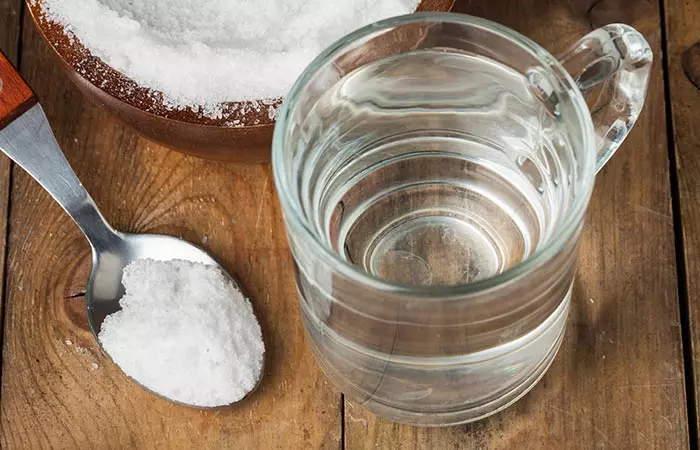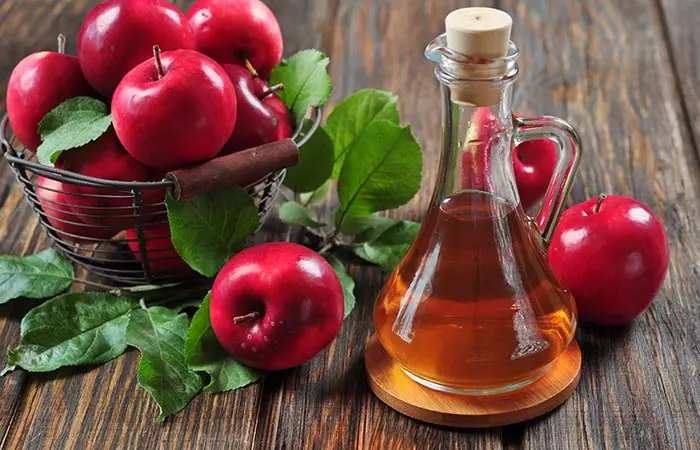Swollen Uvula: Causes, Symptoms, & 8 Home Remedies To Manage
Know what may trigger that uneasy feeling in your throat, from common cold to acid reflux.

Image: Shutterstock
A constant feeling of having something stuck in your throat may not always indicate strep throat. It can be due to a swollen uvula. The uvula is the fleshy part that hangs down your throat and may sometimes become swollen or inflamed. This may cause continuous discomfort and, at times, may result in a cough. You can check this out in a mirror. Multiple factors may lead to a swollen uvula. Keep reading to know more about this condition, natural remedies, and how they may work to provide relief. Scroll down.
In This Article
What Is Uvula?
The roof of the mouth is divided into two parts: (i) the hard palate, which can be felt right above your tongue, and (ii) the soft palate, which is located behind the hard palate, forming the beginning of your throat. The fleshy part that hangs down the soft palate is the uvula.
While the soft palate helps to close your nasal passages as you swallow your food, the uvula helps to push food down your throat. The uvula is made of connective and muscle tissues along with mucous membranes that make it very flexible.
Although rare, in some cases, your uvula, as well as its surrounding areas, may become swollen and inflamed. This condition is referred to as uvulitis.
Inflammatory reactions within the body are often the major cause of a swollen uvula. Let us look at what causes reactions that can trigger uvulitis.
Key Takeaways
- Uvulitis is caused by microbial infections such as respiratory tract infections, strep throat, or mononucleosis that cause your uvula to become red and swollen.
- Uvulitis is more likely to occur if you smoke, drink too much alcohol, breathe contaminated air, and so on.
- Gargling with warm salt water, drinking tea, consuming honey, and other natural home remedies can help speed up the healing process.
- However, you must take your prescribed medications as they are required to treat any underlying disease.
Causes Of A Swollen Uvula And Uvulitis
Microbial infections, such as respiratory tract infections, strep throat, or mononucleosisi A contagious disease common among young adults that spreads through saliva and causes fever, swollen glands, and rash. can cause uvulitis, thereby making your uvula swollen and red.
It is very easy for those with a common cold to develop a swollen uvula as well. This is because those with blocked nasal passages often tend to breathe through their mouth, thereby increasing the chances of an inflamed uvula.
Other possible triggers of an inflamed and swollen uvula are:
- Genetics – Congenital disordersi Disorders present since birth due to problems experienced during pregnancy or inherited from one or both parents. like a cleft lip or palate can cause uvula to become enlarged, off place, or even missing in some cases.
- Allergic reactions – Some allergies can cause fluid to build up in the throat or mouth. This may result in swelling of the uvula. Such reactions can be triggered by certain foods or even an insect bite.
- Vomiting – Vomiting may cause the uvula to swell due to the forceful expulsion of stomach contents and acid. The throat muscles and esophagus contract strongly to eject the stomach contents. This forceful action may irritate and inflame the throat (1).
- Snoring – Snoring due to nasal congestion may also cause a swollen uvula. Breathing through a stuffy nose at night causes faster and more turbulent airflow to reach the back of the nose and the uvula. This swift air creates a suction force and pulls and stretches the uvula to make it swell. The more the uvula swells, the louder the snoring gets (2).
- Dry mouth
- Acid reflux
Certain factors may also put an individual at a higher risk of developing a swollen uvula.
Risk Factors
Factors that can increase your chances of developing uvulitis are:
- Smoking
- Drinking too much alcohol
- Breathing in toxic air
- Any history of surgical intervention
- An injury to the throat or uvula
- Known allergies
- A weakened immune system
When your immune system is not able to get rid of a foreign particle that has entered your body, it can infect the uvula and cause inflammation.
Let’s now look at the signs and symptoms that characterize this condition.
Signs And Symptoms
The signs and symptoms of a swollen uvula are:
- A feeling of something stuck in your throat
- Difficulty in swallowing
- Difficulty in breathing
- An itching or burning sensation in the throat
- A sore throat
- Swelling of the tonsils
- Excess secretion of saliva
- Gagging and regurgitation (nasal)
- Fever
- Pain
Fluffee, a YouTuber, describes experiencing throat discomfort and a swollen uvula in one of his vlogs: “I was struggling to swallow and it just hurt so bad to swallow. And I realized my uvula was swollen (i).” In an attempt to remove what he thought was a clump of phlegm inside the throat, the blogger ripped out the uvula. He notes, “I tugged on my uvula, and I threw up blood and had a panic attack.”
Note: Most of these signs and symptoms are also related to common respiratory infections like pharyngitis, laryngitis, and tonsillitis. Therefore, avoid self-medication to prevent further complications.
If you happen to notice any of the above symptoms, it is best to get yourself diagnosed by a doctor to rule out other possible underlying conditions.
How To Diagnose The Cause Of Uvulitis
Uvulitis is most often a result of an underlying infection or condition.
To diagnose the issue, your doctor will start by asking you about your symptoms, your medical history, the medications you are on, and the symptoms you have been experiencing.
The doctor may also ask if you use tobacco, about your food allergies, and if you have been exposed to any toxic substance(s) recently. They may then do a physical examination to help in diagnosing your condition.
If a physical assessment doesn’t reveal the cause, any of the following tests may be carried out to diagnose your condition. They may include:
- Swab test – Your doctor may swab your throat or nostrils to test for infections.
- Blood test – A blood test can also be conducted to rule out other infections.
If the test results are inconclusive, you may be referred to an allergist, who will carry out further skin and blood tests to identify foods or other substances that may have been causing the inflammation.
In most cases, the cause of a swollen uvula is not of much concern. It is usually a result of an infection or allergy that can be treated.
However, since the symptoms of uvulitis can be quite bothersome, here are some all-natural home remedies that can speed up the healing process. What’s more? Some of these remedies may also help in combating infections that are responsible for triggering an inflamed uvula.
8 Natural Remedies To Manage Uvulitis
1. Gargle With Warm Salt Water

You Will Need
- 1 teaspoon of table salt
- 1 glass of hot water
What You Have To Do
- Add a teaspoon of table salt to a glass of hot water.
- Mix well until the salt dissolves. Allow it to cool down.
- Gargle with the salt water for a few seconds.
- Spit it out.
- Repeat until you use up all of the mixture.
How Often You Should Do This
You may do this 2-3 times daily.
Why This Works
Gargling to wash your throat is a common practice to prevent upper respiratory infections
(3). Doing it daily can also help in treating a swollen uvula caused by such infections. It is also a good home remedy for strep throat infection and can help you feel better.
2. Hot Tea And Honey

You Will Need
- ½ – 1 teaspoon of your favorite tea powder
- 1 cup of water
- Honey
What You Have To Do
- Add half to one teaspoon of your favorite tea powder to a cup of water.
- Bring it to a boil in a saucepan.
- Simmer for a minute or two and strain.
- Once the tea cools down a bit, add some honey to it.
- Drink the warm tea.
How Often You Should Do This
You can drink this 2-3 times daily.
Why This Works
A warm cup of tea (or any hot drink) can help reduce the symptoms of a cough and throat infection (4). Adding honey to the tea increases its effectiveness (5). This can also help decrease the swelling of the uvula.
3. Ice Chips

You Will Need
A few ice chips made of distilled water
What You Have To Do
Suck on a few ice chips.
How Often You Should Do This
You may do this 1-2 times daily.
Why This Works
While there is no particular study to back this claim, according to anecdotal evidence, sucking on ice chips can help soothe a sore throat and reduce inflammation of the uvula. It is also considered a great home remedy for tonsils as it helps to relieve the pain and inflammation that comes with the infection.
4. Holy Basil Leaves

You Will Need
- A handful of holy basil leaves
- A cup of water
What You Have To Do
- Bring a cup of water to a boil in a saucepan.
- Add a handful of holy basil leaves to it and simmer for 5-7 minutes.
- Strain and allow the tea to cool a bit.
- Drink it up.
How Often You Should Do This
You may do this 1-2 times daily for best results.
Why This Works
Holy basil (tulsi) exhibits powerful anti-inflammatory and antimicrobial properties (6). It may thus help combat infections causing the condition and alleviate the symptoms of uvulitis.
5. Garlic

You Will Need
1-2 cloves of peeled garlic
What You Have To Do
- Chew on one to two peeled garlic cloves.
- If the flavor is too strong for your liking, you can add minced garlic to your favorite salads and dishes.
How Often You Should Do This
You may do this once daily for best results.
Why This Works
Garlic possesses broad-spectrum antimicrobial and anti-inflammatory properties (7), (8). These properties can help combat the infection-causing microbes that could be responsible for triggering uvulitis and reduce the swelling in your uvula.
6. Turmeric

You Will Need
- 1 teaspoon of turmeric powder
- 1 glass of hot milk
What You Have To Do
- Add a teaspoon of turmeric powder to a glass of hot milk.
- Mix well and allow it to cool down for a while.
- Drink the turmeric and milk mixture.
How Often You Should Do This
You can drink this once daily.
Why This Works
The active compound in turmeric is curcumin. Curcumin exhibits antibacterial, antifungal, and antiviral activities that can aid in fighting upper respiratory as well as other microbial infections (9). Its anti-inflammatory nature can also help in reducing the swelling of your uvula (10).
 Quick Tip
Quick Tip7. Essential Oils

You Will Need
- Thyme or cinnamon essential oil
- A diffuser
- Water
What You Have To Do
- Add a drop of thyme or cinnamon essential oil to a diffuser filled with water.
- Switch the diffuser on and inhale the aroma.
How Often You Should Do This
You may do this once daily until your symptoms improve.
Why This Works
Aromatherapy using essential oils of thyme or cinnamon can help in alleviating the symptoms of a throat infection due to their antimicrobial nature (11). These oils also exhibit anti-inflammatory activities (12). Both these properties help in reducing the swelling of the uvula and treating the infection causing the condition.
8. Apple Cider Vinegar

You Will Need
- 1 tablespoon of apple cider vinegar (ACV)
- 1 cup of warm water
- Honey
What You Have To Do
- Add a tablespoon each of organic ACV and honey to a cup of warm water.
- Stir well.
- You can either drink this mixture or simply use it for gargling.
How Often You Should Do This
You may do this once daily.
Why This Works
Apple cider vinegar possesses antimicrobial and anti-inflammatory properties (13), (14). It can not only help combat microbial infections, which are the main culprits behind uvulitis, but also reduce inflammation and swelling of your uvula.
 Quick Tip
Quick TipTry the above remedies for relief from a swollen uvula. However, if your condition does not clear on its own or despite using these remedies, consult with your doctor. They will suggest the appropriate treatment and tips to prevent recurrence of the condition. Scroll down to find out when exactly should you seek immediate medical care for uvulitis.
When To Seek Medical Attention
You should seek medical care for uvulitis if you experience any of the following:
- Persistent or worsening symptoms
- Difficulty breathing
- Severe pain
- Fever
- Increased swelling
The presence of fever and breathing issues are usually signs of an infection. In this case, your doctor may prescribe you medications like antibiotics and corticosteroids (15).
There are also numerous measures you can take to prevent uvulitis altogether. Learn about them in the following section.
How To Prevent A Swollen Uvula
- Keep yourself hydrated by drinking plenty of fluids.
- Have warm tea.
- Get ample rest to help your body heal fast when you are battling an infection.
- Limit your alcohol intake.
- Quit smoking.
- Stay away from potential triggers like a toxic environment or second-hand smoke.
- Stay away from foods that you are allergic to.
- Eat your meals on time.
Infographic: A Simple Guide To Understanding Swollen Uvula
The feeling of having something stuck in your throat can be painful and annoying. Factors like acid reflux and a common cold can contribute to your swollen uvula. To help you understand the causes and the simple remedies for treating this condition, check out the infographic below to know more!

Illustration: StyleCraze Design Team
A swollen uvula or uvulitis may cause continuous discomfort and can be irritating. This fleshy piece of tissue that hangs down the back of the throat, if inflamed, may cause difficulty swallowing and breathing. A swollen uvula may also cause throat soreness, hoarseness, fever and pain. An injury to the throat and excess alcohol or smoking are the common risk factors for uvulitis. Some effective remedies to treat a swollen uvula include gargling with warm salt water and taking hot tea and honey, ice chips, holy basil leaves, and garlic. In addition, keep yourself hydrated, quit smoking, and have warm tea to help prevent uvulitis.
Frequently Asked Questions
Does ibuprofen help a swollen uvula?
Ibuprofen is an NSAID that helps with inflammation, and it may help relieve a swollen uvula. However, in rare cases, NSAIDs may lead to NSAID-induced angioedemai An allergic reaction to any substance or medicine that causes swelling under the skin. It can be life-threatening. , a rare condition that causes a swollen uvula. It is advisable to seek medical guidance before self-medicating with NSAIDs if you have a swollen uvula.
Do you need antibiotics for uvulitis?
Uvulitis caused by a bacterial infection may need antibiotics to get better. However, in some cases, the condition may resolve on its own with self-care and home remedies. If an allergic reaction causes uvulitis, antibiotics will not help and you may be prescribed antihistaminesi These drugs help relieve allergy symptoms, such as runny nose and watery eyes commonly caused by influenza and the common cold. and/or corticosteroidsi A type of anti-inflammatory drug that reduces swelling and allergic reactions, such as skin allergies, asthma, and arthritis. .
Are there any complications associated with a swollen uvula?
Generally, a swollen uvula is not a serious concern. However, in cases of severe swelling, it can block your respiratory passage and cause choking or discomfort while breathing and swallowing. Hence, it is best to visit a doctor to treat the symptoms.
How long does it take for a swollen uvula to heal?
A swollen uvula resolves itself within 1-2 days. Easy home remedies like warm salt water gargle or hot honey tea can alleviate the discomfort.
Is it safe to eat and drink with a swollen uvula?
Absolutely. You may experience slight discomfort while eating or drinking with a swollen uvula, but consuming hot food and drinks may provide some relief.
What should I avoid eating or drinking if I have a swollen uvula?
Avoid foods that are hard, cold, spicy, and acidic, as they may irritate the inflammation.
Learn about the causes and symptoms of a swollen uvula, from allergies to infections. Watch this quick video to get tips on how to treat and prevent it.
Personal Experience: Source
StyleCraze's articles are interwoven with authentic personal narratives that provide depth and resonance to our content. Below are the sources of the personal accounts referenced in this article.
(i) My Swollen Uvula Story.https://www.youtube.com/watch?v=A_1H3qqm3rE
References
Articles on StyleCraze are backed by verified information from peer-reviewed and academic research papers, reputed organizations, research institutions, and medical associations to ensure accuracy and relevance. Read our editorial policy to learn more.
- “ A rare case of uvulitis” Archives of Disease in Childhood, BMJ Journals
- “Edema of the Uvula: Etiology, Risk Factors, Diagnosis, and Treatment.” Journal of Investigational Allergology and Clinical Immunology
- “Prevention of upper respiratory tract infections by gargling: a randomized trial.” American Journal of Preventive Medicine, US National Library Of Medicine.
- “The effects of a hot drink on nasal airflow and symptoms of common cold and flu.” Rhinology, US National Library Of Medicine.
- “Honey for treatment of cough in children” Canadian Family Physician, US National Library Of Medicine.
- “Tulsi – Ocimum sanctum: A herb for all reasons” Journal Of Ayurveda and Integrative Medicine, US National Library Of Medicine.
- “Alliumsativum (garlic) — A natural antibiotic” Medical Hypotheses, ScienceDirect.
- “Immunomodulation and Anti-Inflammatory Effects of Garlic Compounds” Journal Of Immunology Research, US National Library Of Medicine.
- “A Review on Antibacterial, Antiviral, and Antifungal Activity of Curcumin” BioMed Research International, US National Library Of Medicine.
- “Antioxidant and anti-inflammatory properties of curcumin.” Advances in Experimental Medicine and Biology, US National Library Of Medicine.
- “In Vitro Antibacterial Activity of Essential Oils against Streptococcus pyogenes” Evidence-based Complementary and Alternative Medicine, US National Library Of Medicine.
- “Cinnamon: A Multifaceted Medicinal Plant” Evidence-based Complementary and Alternative Medicine, US National Library Of Medicine.
- “Antimicrobial activity of apple cider vinegar against Escherichia coli, Staphylococcus aureus and Candida albicans; downregulating cytokine and microbial protein expression” Scientific Reports, US National Library Of Medicine.
- “Anti-obesity and anti-inflammatory effects of synthetic acetic acid vinegar and Nipa vinegar on high-fat-diet-induced obese mice” Scientific Reports, US National Library Of Medicine.
- “Uvula infections and traditional uvulectomy: Beliefs and practices in Luwero district, central Uganda” PLOS Global Public Health, US National Library Of Medicine.
Read full bio of Dr. Zeel Gandhi
Read full bio of Shaheen Naser
Read full bio of Arshiya Syeda
Read full bio of Dipti Sharma




















Community Experiences
Join the conversation and become a part of our empowering community! Share your stories, experiences, and insights to connect with other beauty, lifestyle, and health enthusiasts.